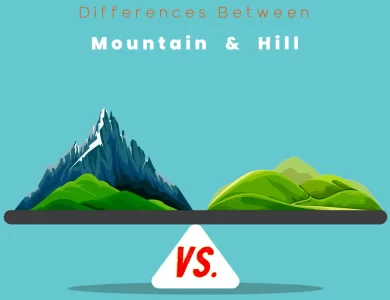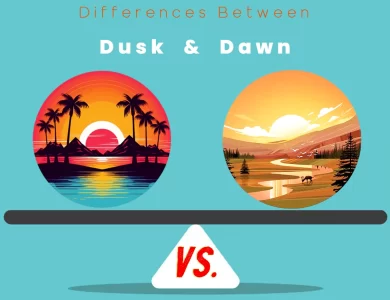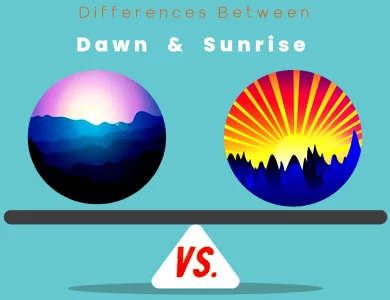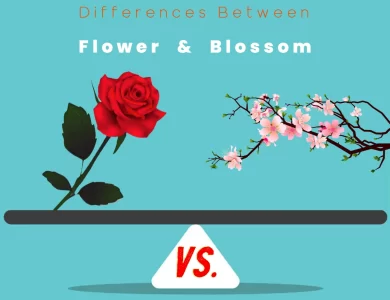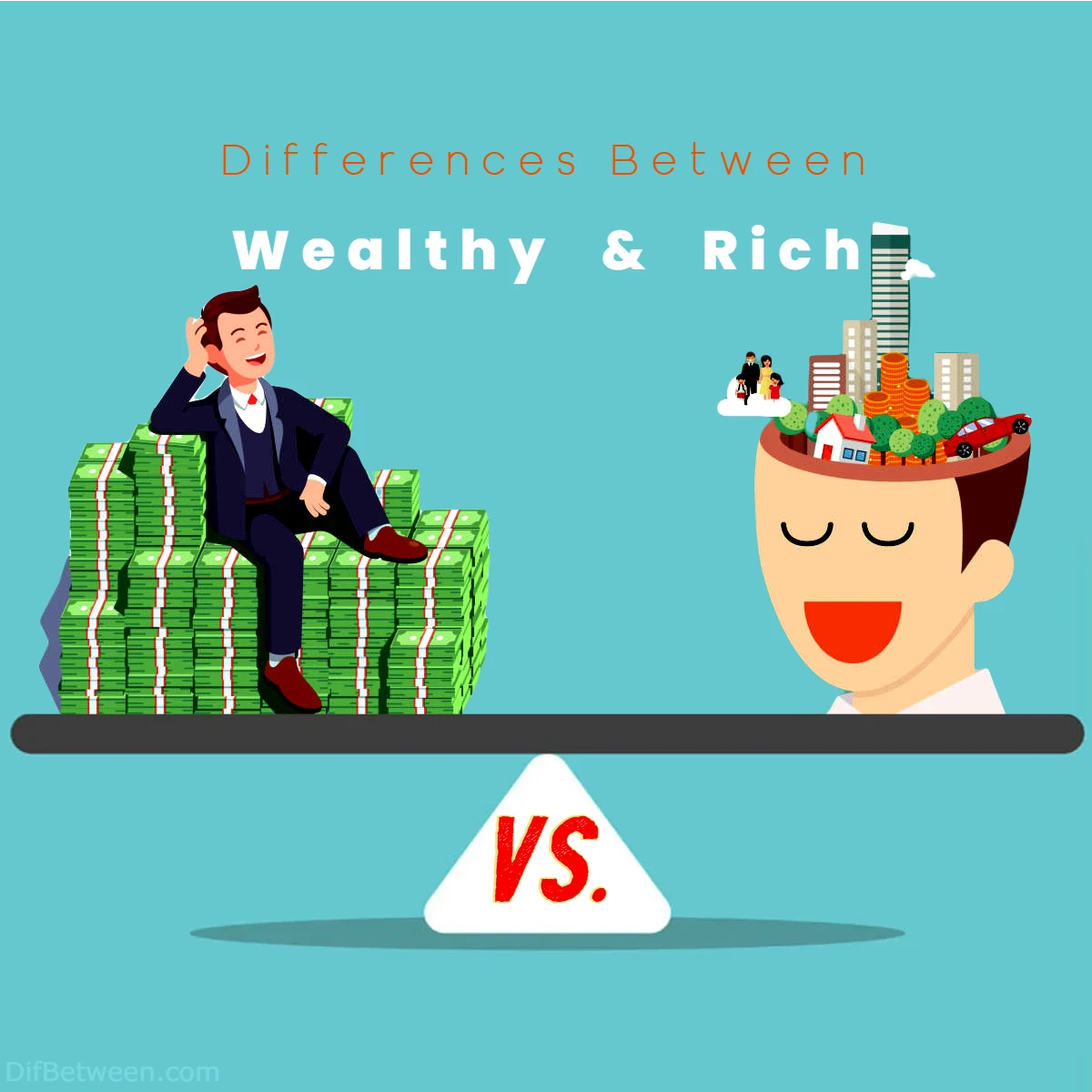
| Aspect | Wealthy | Rich |
|---|---|---|
| Components | Diverse range of assets and resources | Primarily monetary or liquid assets |
| Examples | Real estate, investments, businesses, valuable possessions | Large savings, high income, significant cash reserves |
| Scope | Comprehensive | Singular |
| Measurement | Net worth | Liquid assets or income |
| Financial Security | Long-term financial security and stability | Potential for temporary wealth |
| Generational Aspect | May include generational planning and legacy | May not easily transfer to heirs |
| Focus | Asset accumulation, passive income | Earnings, cash flow, lifestyle |
| Long-Term Perspective | Typically focused on long-term investments | May involve short-term thinking |
| Financial Literacy | Requires financial expertise and management | May be achieved with high earnings |
| Tax Planning | Often involves tax-efficient strategies | Tax planning may be a consideration |
| Legacy Planning | Prioritizes leaving a financial legacy for heirs | Less emphasis on legacy planning |
| Financial Freedom | Provides financial freedom due to passive income | May require active income for expenses |
| Debt Management | Emphasis on managing debt to build assets | High-income earners may carry some debt |
| Investment Approach | Focus on income-generating assets | May prioritize investments with high returns |
| Risk Tolerance | May involve market-related risks | May be less exposed to market volatility |
| Lifestyle | May be more frugal to preserve wealth | Tendency to enjoy a comfortable lifestyle |
| Flexibility in Spending | May have limitations on discretionary spending | More flexibility in spending habits |
| Balance of Wealth and Riches | May prioritize long-term wealth but enjoy present | Balancing both wealth and lifestyle |
| Financial Education | Often requires deep financial knowledge | Still benefits from financial literacy |
| Approach to Financial Goals | Focused on securing financial future and legacy | Driven by immediate financial rewards |
| Decision Making | Strategic and patient financial decision-making | May involve quicker financial decisions |
In a world where the terms “wealthy” and “rich” are casually tossed around, it’s crucial to grasp the nuanced disparities between them. Are you striving for enduring financial security and the possibility of leaving a legacy for generations to come, or does your heart beat to the rhythm of immediate rewards and a comfortable, well-lived life? Our mission here is to unravel these distinctions, equipping you with the knowledge to make informed financial choices.
Differences Between Wealthy and Rich
The main differences between wealthy and rich lie in the scope and nature of their financial assets. While being wealthy encompasses a diverse range of assets beyond just money, including real estate, investments, and valuable possessions, being rich predominantly focuses on having a substantial amount of liquid assets or a high income. Wealth often provides long-term financial security, can be passed down through generations, and requires a deeper understanding of financial management. In contrast, being rich may offer immediate comfort and flexibility in spending but may lack the enduring financial stability that wealth provides.
Defining
Wealth refers to the abundance of assets, resources, and financial security that an individual or entity possesses. It’s a broader concept that encompasses not only monetary assets but also non-monetary assets such as real estate, investments, businesses, and valuable possessions. Wealth is often measured by an individual’s net worth, which takes into account both assets and liabilities.
Riches, on the other hand, are primarily related to monetary wealth or having a substantial amount of money or liquid assets. Being rich typically means having a high income, substantial savings, or significant financial resources at your disposal. While riches are a part of wealth, they do not necessarily represent the full scope of an individual’s financial well-being.
Now that we have a clear understanding of these terms, let’s delve into the key differences between being wealthy and being rich.
Key Differences
Wealth is Comprehensive, Riches are Singular
One of the fundamental distinctions between wealth and riches is the scope of their assets. Wealth is all-encompassing, including not only monetary wealth but also a wide range of assets and resources. These can include real estate properties, investments in stocks and bonds, ownership of businesses, valuable art collections, and more. In essence, wealth is a holistic measure of an individual’s financial well-being, taking into account both tangible and intangible assets.
| Aspect | Wealth | Riches |
|---|---|---|
| Components | Diverse range of assets and resources | Primarily monetary or liquid assets |
| Examples | Real estate, investments, businesses, valuable possessions | Large savings, high income, significant cash reserves |
| Scope | Comprehensive | Singular |
| Measurement | Net worth | Liquid assets or income |
Being rich, on the other hand, is more singular in focus. It primarily pertains to having a substantial amount of money or liquid assets. A person can be considered rich if they have a high income, significant savings, or a substantial amount of cash at their disposal. While being rich is undoubtedly a desirable financial state, it doesn’t necessarily encompass the breadth of financial security that wealth provides.
Wealth Offers Long-Term Security, Riches May Be Temporary
Another key difference between wealth and riches is the level of financial security they provide. Wealth is often associated with long-term financial security and stability. It includes assets that can generate passive income, such as rental income from real estate or dividends from investments. Wealthy individuals typically have a diversified portfolio of assets that can weather economic downturns and provide financial stability over the long haul.
In contrast, riches can be more fleeting. While having a high income or significant savings may make someone rich in the short term, it does not guarantee long-term financial security. An individual who is rich but lacks a diversified portfolio of assets may be more vulnerable to financial setbacks, such as job loss or market downturns. Without a solid financial foundation, riches can come and go.
Wealth Requires Financial Literacy, Riches Can Be Easier to Attain
Building and maintaining wealth often necessitate a high level of financial literacy and discipline. Wealthy individuals typically have a deep understanding of investment strategies, tax planning, and wealth preservation. They make informed decisions about their assets and continually work to grow their wealth through prudent financial management.
On the other hand, becoming rich can sometimes be a more straightforward process. It may involve earning a high income through a lucrative career or business venture, receiving a windfall, or inheriting a significant sum of money. While these paths to riches may not require the same level of financial expertise, they still demand responsible financial management to avoid squandering newfound wealth.
Wealth Has a Generational Aspect, Riches May Not
One of the most significant distinctions between wealth and riches is their potential to be passed down through generations. Wealth often has a generational aspect, as wealthy individuals can establish trusts, create estate plans, and pass on their assets to their heirs. This allows wealth to endure beyond an individual’s lifetime, benefiting future generations.
Riches, however, may not have the same longevity. If an individual’s wealth is primarily tied to their high income or a single source of income, it may not be easily transferable to their heirs. Without proper financial planning, riches can diminish over time, leaving little to pass on to the next generation.
Wealth Focuses on Net Worth, Riches Emphasize Liquid Assets
When evaluating financial well-being, the metrics used to assess wealth and riches differ. Wealth is typically measured by an individual’s net worth, which takes into account all assets (e.g., real estate, investments, businesses) minus liabilities (e.g., debts, mortgages). Net worth reflects the true extent of an individual’s financial holdings and is a comprehensive indicator of wealth.
Conversely, riches are often measured by the amount of liquid assets a person has readily available, such as cash, savings accounts, or marketable securities. This emphasis on liquid assets reflects the immediate financial resources at one’s disposal, which can be spent or invested as needed.
Wealth Focuses on Assets, Riches on Income
Another way to differentiate between wealth and riches is by examining the primary focus of each. Wealth is primarily centered around assets. It includes ownership of valuable resources such as real estate, businesses, investments, and valuable possessions. The accumulation of assets is a key driver of wealth, and individuals with substantial wealth often prioritize growing and diversifying their asset portfolio.
Conversely, riches tend to be more focused on income. Being rich often means having a high salary, substantial savings, or significant cash flow. While assets can certainly contribute to one’s riches, the emphasis is often on the money one earns or has at their immediate disposal. A wealthy person may have significant assets but not necessarily a high income, whereas a rich individual typically enjoys a comfortable income.
Wealth Provides Financial Freedom, Riches Offer Comfort
Wealth and riches also differ in the level of financial freedom they provide. Wealth often grants a higher degree of financial freedom because it includes assets that can generate passive income. Wealthy individuals may have investments that generate rental income, dividends, or interest, allowing them to maintain their lifestyle without relying solely on active income from work.
On the other hand, riches may provide a comfortable lifestyle but may not offer the same degree of financial freedom. Someone who is rich due to a high-paying job, for example, may need to continue working to sustain their lifestyle. Without income from their job, their riches may dwindle over time, leading to potential financial stress.
Wealth Encourages Long-Term Planning, Riches May Foster Short-Term Thinking
Building and preserving wealth often require a long-term perspective. Wealthy individuals typically engage in strategic financial planning, including estate planning and investment strategies that span decades. They are more likely to think about the financial well-being of future generations and take steps to protect and grow their assets over time.
Conversely, those focused on riches may be more inclined to adopt a short-term mindset. A high-income earner, for instance, might prioritize immediate consumption and lifestyle enhancement. While this can lead to a comfortable life in the short term, it may not provide the same level of financial security or legacy planning that wealth can offer.
Wealth Is About Building Assets, Riches Can Be About Spending
Wealth accumulation often involves actively building and acquiring assets over time. Wealthy individuals may invest in businesses, real estate, stocks, and other income-generating assets. The goal is to grow and diversify their portfolio of assets, which in turn increases their overall wealth.
In contrast, riches can sometimes be more about spending and enjoying a higher standard of living. Someone with a high income or a substantial windfall may choose to indulge in luxurious purchases, expensive vacations, or other forms of conspicuous consumption. While there’s nothing inherently wrong with enjoying one’s wealth, this spending mindset may not contribute to long-term financial security.
Strategies for Building Wealth and Achieving Riches
Now that we’ve explored the key differences between wealth and riches, it’s essential to understand the strategies that individuals can employ to build wealth and achieve riches. These strategies differ in their focus and approach, depending on your financial objectives.
Strategies for Building Wealth
Diversify Your Assets
Wealth-building often involves diversifying your asset portfolio. Instead of putting all your resources into a single investment or asset class, spread your investments across various options. Diversification can help manage risk and potentially increase your overall returns. Consider investments in stocks, bonds, real estate, and other income-generating assets.
Invest for the Long Term
Wealth accumulation typically requires a long-term perspective. Invest with the intention of holding assets for extended periods to benefit from compounding returns. Over time, the growth of your investments can significantly contribute to your wealth. Patient and disciplined investing can be a key factor in building wealth.
Focus on Income-Generating Assets
To build wealth, prioritize investments that generate passive income. Rental properties, dividend-paying stocks, and interest-bearing bonds can provide regular income streams. This income can help cover expenses and reinvest in additional assets, accelerating your wealth-building efforts.
Minimize Debt
Debt can erode your wealth-building efforts if not managed properly. While some debt may be necessary, such as a mortgage for real estate investment, focus on minimizing high-interest debt, like credit card balances. Paying down debt reduces interest payments and frees up more funds for wealth-building investments.
Embrace Tax-Efficient Strategies
Understanding tax strategies can help you preserve and grow your wealth. Consult with tax professionals to explore tax-efficient investment options, retirement accounts, and estate planning strategies that minimize tax liabilities and maximize your after-tax returns.
Strategies for Achieving Riches
Increase Your Earnings
To achieve riches, one of the most direct strategies is to increase your earnings. This can be accomplished by pursuing higher-paying career opportunities, starting a profitable business, or seeking out additional sources of income, such as investments or side ventures. A higher income provides the financial means to accumulate riches.
Save and Invest Wisely
While earning more is essential, it’s equally crucial to save and invest wisely. Establish a budget that allows you to save a significant portion of your income and invest it in assets that can grow over time. Consider consulting with a financial advisor to make informed investment decisions aligned with your riches goals.
Leverage Windfalls
Windfalls, such as inheritances, bonuses, or unexpected gains, can fast-track your path to riches. Instead of spending windfalls frivolously, consider how you can leverage them to generate additional wealth. This may involve investing a portion of the windfall in income-generating assets or paying down debt to reduce interest expenses.
Live Below Your Means
Living below your means involves maintaining a lifestyle that consumes less than your income. This creates a surplus that can be directed toward savings and investments. Discipline in managing your expenses can free up more resources for wealth accumulation.
Continuously Improve Financial Literacy
To achieve riches, it’s essential to continually educate yourself about personal finance and investment strategies. The more you understand about managing and growing your wealth, the more effectively you can make financial decisions that lead to riches.
Wealthy or Rich : Which One is Right Choose for You?
The choice between pursuing wealth or riches is a deeply personal one that depends on your values, goals, and financial aspirations. Both paths have their merits and considerations, and there’s no one-size-fits-all answer. In this section, we’ll delve deeper into the factors to consider when deciding whether to prioritize wealth or riches.
Consider Your Financial Goals
Your financial goals play a significant role in determining whether wealth or riches align better with your aspirations.
Prioritize Wealth If:
- Long-Term Security Matters: If your primary concern is securing your financial future and that of your heirs, wealth-building may be the right path. Wealth provides lasting financial security through diversified assets and income streams.
- Legacy Planning is Important: If you wish to leave a financial legacy for future generations, wealth allows you to establish trusts, create estate plans, and pass on assets. It’s a strategic choice for those who want to preserve and grow their wealth over generations.
- Financial Freedom is a Goal: Wealth often provides a higher degree of financial freedom due to passive income from investments. If you value the freedom to make life choices without being solely reliant on active income, wealth is worth pursuing.
Prioritize Riches If:
- Enjoying the Present is Vital: If you have a strong desire to enjoy a comfortable lifestyle, travel, and indulge in experiences while you’re still young and active, achieving riches may be your focus. Riches provide the means to enjoy the present to the fullest.
- Career and Earnings are Top Priorities: If your passion lies in your career, business ventures, or income-earning activities, and you’re driven to maximize your earning potential, striving for riches can provide the resources to support your ambitions.
- Flexibility in Spending is Key: Riches can offer more flexibility in your spending habits. If you prefer the freedom to make large discretionary purchases or investments, such as luxury cars or extravagant vacations, then having riches readily available can cater to those desires.
Assess Your Risk Tolerance
Consider your risk tolerance when deciding between wealth and riches. Building wealth often involves long-term investments that may be subject to market fluctuations. It requires patience and a tolerance for potential ups and downs in asset values.
On the other hand, achieving riches, especially through a high-income career or business venture, may provide more immediate financial rewards. However, it can come with its own set of risks, such as job insecurity or business challenges.
Evaluate Your Financial Literacy
Your level of financial literacy can influence your choice between wealth and riches. Wealth-building often requires a deeper understanding of investment strategies, tax planning, and asset management. If you enjoy learning about finance and are willing to invest time in financial education, building wealth may be a more natural fit.
Riches, while still benefiting from financial knowledge, can be more straightforward to achieve with a focus on earning and saving. If you prefer a simpler approach to financial success, this might be the path for you.
Find a Balance
It’s important to note that wealth and riches are not mutually exclusive. Many individuals aim to strike a balance between the two, combining wealth-building strategies with income-earning endeavors to enjoy a comfortable lifestyle in the present while securing their long-term financial future.
Balancing wealth and riches can provide financial security along with the ability to enjoy life’s pleasures. This approach involves carefully managing your financial resources, investing wisely, and maintaining discipline in both wealth preservation and income generation.
Seek Professional Guidance
Regardless of whether you lean towards wealth or riches, seeking professional financial advice can be invaluable. Financial advisors and planners can help you create a tailored financial strategy that aligns with your goals and risk tolerance. They can also assist with investment choices, tax planning, and estate planning, depending on your priorities.
Conclusion
Ultimately, the choice between pursuing wealth or riches is a personal one that should align with your values, goals, and lifestyle preferences. There’s no universal right or wrong answer, and your financial journey is unique to you. Whether you aim to build lasting wealth, enjoy the benefits of riches, or find a balance between the two, the key is to make informed financial decisions that align with your aspirations and provide the financial security and happiness you desire.
FAQs
Being wealthy encompasses a wide range of assets, including real estate, investments, and valuable possessions, while being rich primarily means having a significant amount of liquid assets or a high income.
Yes, it’s possible for someone to be both wealthy and rich. They may have substantial assets and a high income, combining the best of both financial worlds.
There’s no one-size-fits-all answer. It depends on your financial goals and values. Wealth provides long-term security and legacy planning, while riches offer immediate lifestyle benefits.
Financial literacy is crucial for both wealth and riches. It helps you make informed decisions, manage assets, and optimize your financial situation, regardless of your chosen path.
Building wealth often takes time, as it involves prudent investment and asset management. Achieving riches can happen more quickly through a high income or windfalls.
Wealth often involves tax-efficient strategies due to diverse assets, while riches may focus on income, which may have different tax implications. Consult a tax professional for personalized advice.
Consider your financial goals, risk tolerance, lifestyle preferences, and long-term plans. Seeking professional financial advice can also help you make an informed decision.
Yes, transitions are possible. Someone rich can invest wisely to build wealth over time, and a wealthy individual may choose to enjoy their riches by adjusting their financial strategy.
Financial planning is essential for both paths. It helps you set goals, create a roadmap, and make strategic decisions to achieve financial success, whether through wealth or riches.
Finding a balance that suits your goals is subjective. Some individuals aim to balance both by building wealth for long-term security while enjoying the benefits of riches in the present.
Read More:
Contents

